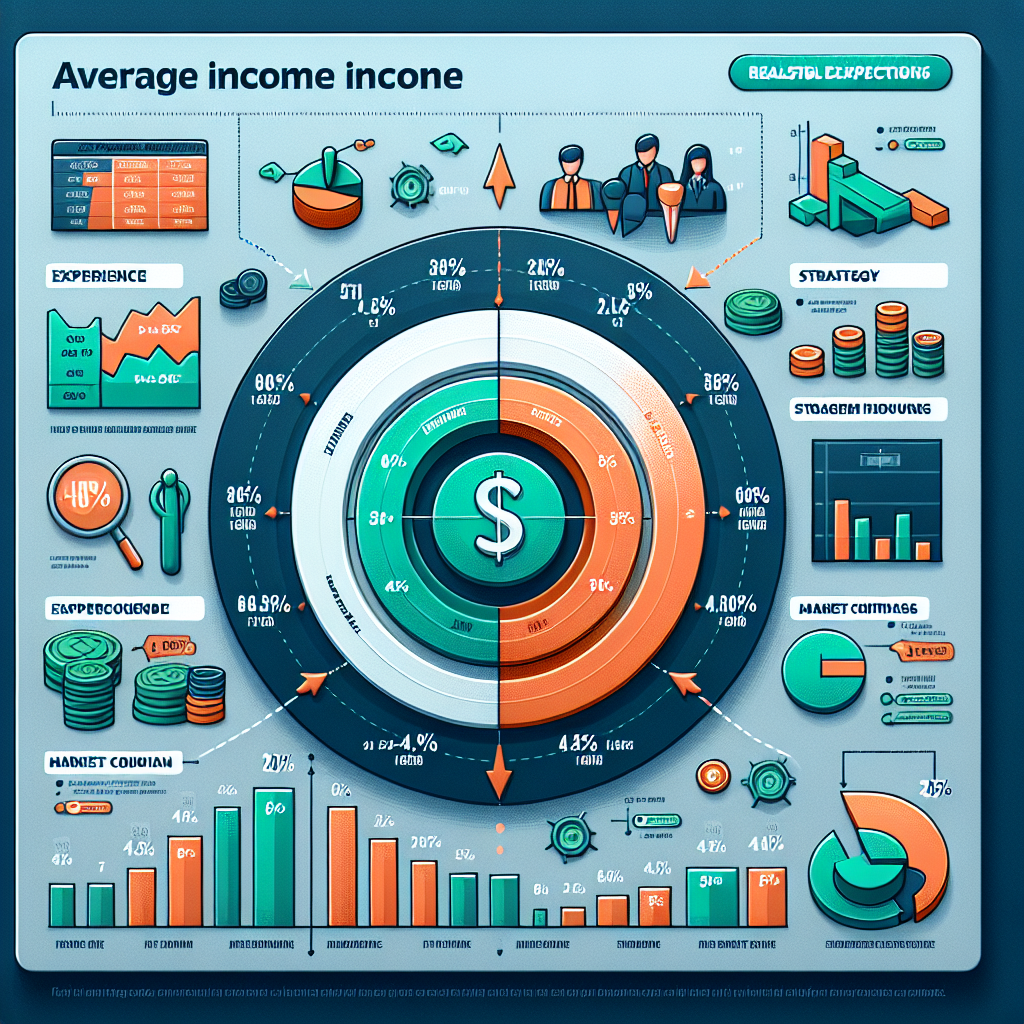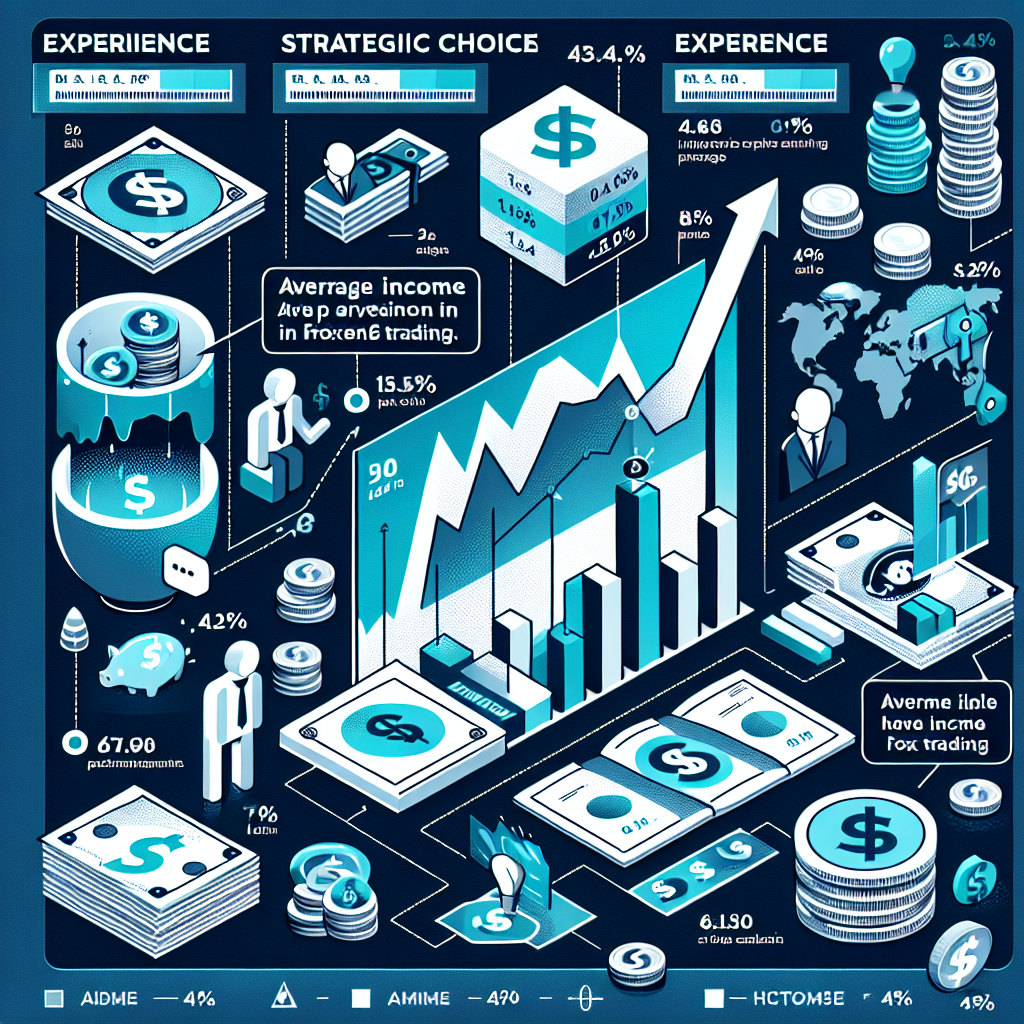Table of Contents
In the realm of financial markets, Forex trading stands as a compelling endeavor for many individuals seeking to generate income. The question of what constitutes the average income for Forex trading often arises, as it is an essential factor in determining the feasibility of pursuing such a career. To shed light on this matter, this article will delve into the intricacies of Forex trading income and explore various factors that contribute to its fluctuation, providing readers with an understanding of the potential rewards and challenges associated with this lucrative field.

Understanding Forex Trading
What is Forex Trading?
Forex trading, also known as foreign exchange trading, is the process of buying and selling currencies in the global market. It is the largest and most liquid financial market in the world, with a daily trading volume exceeding $6 trillion. Forex trading enables individuals and institutions to take advantage of fluctuations in currency exchange rates to generate profits.
How Does Forex Trading Work?
Forex trading involves the simultaneous buying of one currency and selling of another. Currencies are always traded in pairs, such as the EUR/USD or GBP/JPY. When you buy a currency pair, you are essentially buying the base currency and selling the quote currency. The exchange rate of the currency pair determines the value of the trade. Traders can profit from forex trading by accurately predicting the direction in which the exchange rate will move.
Trading Strategies
There are various trading strategies that forex traders employ to make profitable trades. These strategies can be categorized into two main types: technical analysis-based strategies and fundamental analysis-based strategies. Technical analysis involves studying historical price patterns and using technical indicators to identify future price movements. On the other hand, fundamental analysis looks at economic factors, such as interest rates, employment data, and geopolitical events, to predict currency movements.
Risk Management
Risk management is a crucial aspect of forex trading. It involves implementing strategies and techniques to minimize potential losses and protect your trading capital. Traders can use stop-loss orders to automatically exit a trade at a predetermined level if the market moves against them. They can also employ proper position sizing techniques to ensure that they do not risk more than a certain percentage of their trading capital on each trade.
Role of Technical Analysis
Technical analysis plays a significant role in forex trading. It helps traders identify key levels of support and resistance, trend directions, and potential trade setups. Traders use various technical indicators, such as moving averages, oscillators, and trend lines, to analyze price patterns and make informed trading decisions. Technical analysis provides valuable insights into market trends and helps traders anticipate potential reversals or breakout opportunities.
Role of Fundamental Analysis
Fundamental analysis is essential for understanding the broader economic factors that impact currency values. Traders who employ fundamental analysis focus on economic indicators, central bank policies, geopolitical events, and other macroeconomic factors to determine the intrinsic value of a currency. By analyzing these factors, traders can make informed decisions about the direction of a currency pair and take advantage of long-term market trends.
Determining Income in Forex Trading
Factors Affecting Income
Several factors influence the income potential in forex trading. These factors include market conditions, trading strategy, risk tolerance, trading capital, and overall trading performance. Forex trading is highly volatile and unpredictable, and profitability can vary greatly depending on these factors.
Capital Investment
The amount of capital invested in forex trading can significantly impact potential income. A larger trading capital allows for bigger position sizes and the possibility of higher returns. However, it is essential to note that trading with larger capital also carries a higher level of risk. Traders should carefully assess and determine the appropriate amount of capital they are willing to invest based on their risk tolerance and financial situation.
Experience and Skill Level
Experience and skill level play a crucial role in determining income in forex trading. Novice traders may struggle initially and experience losses as they learn and develop their trading skills. As traders gain experience and refine their strategies, they can improve their profitability. It takes time, effort, and continuous learning to become consistently profitable in forex trading.
Trading Style
The trading style employed by a trader can also influence their income potential. Some traders prefer short-term trading, such as scalping or day trading, while others opt for longer-term positions. Each trading style has its advantages and disadvantages, and traders need to choose a style that suits their personality, time availability, and risk tolerance. Different trading styles can yield different income levels.
Market Volatility
Forex markets are known for their high volatility, which can create both opportunities and risks for traders. Higher market volatility often leads to larger price movements, potentially resulting in higher profits. However, it also increases the likelihood of significant losses if trades go against expectations. Traders need to adapt their strategies and risk management techniques to different market conditions to maximize their income potential.
Leverage and Margin
Leverage allows traders to control larger positions with a smaller amount of capital. It amplifies both profits and losses. While leverage can increase income potential, it also exposes traders to higher risks. Traders must use leverage carefully and consider their risk tolerance and overall trading strategy when utilizing leverage. Similarly, margin requirements determine the amount of capital required to open a position. Understanding and managing margin effectively is crucial for determining income in forex trading.

Challenges and Risks in Forex Trading
High Volatility
The high volatility of the forex market is a significant challenge for traders. Price movements can be quick and unpredictable, making it challenging to accurately forecast market trends. Traders must develop strategies that can adapt to volatile market conditions and implement proper risk management practices to mitigate potential losses.
Lack of Regulation
Forex trading is primarily conducted over-the-counter (OTC), meaning it is not traded on a centralized exchange. This lack of centralized regulation can expose traders to potential risks, such as fraudulent brokers or unfair trading practices. It is essential for traders to work with reputable brokers and conduct thorough due diligence to ensure the safety of their funds and trades.
Losing Trades
Losses are an inevitable part of forex trading. Even the most experienced traders experience losing trades. It is crucial for traders to understand and accept this reality and implement risk management strategies to limit losses. Learning from losing trades and continuously improving trading skills can help mitigate the impact of losses on overall profitability.
Psychological Pressures
Forex trading can be psychologically challenging. Traders often face emotional pressures, such as fear, greed, and impatience, which can cloud their judgment and lead to poor decision-making. Successful traders develop emotional control and discipline to overcome these psychological pressures and stick to their trading plans.
Scams and Fraudulent Practices
The forex market is not immune to scams and fraudulent practices. Traders need to be cautious and vigilant when choosing brokers, signal providers, or educational services. Conducting thorough research, seeking recommendations, and verifying the legitimacy of individuals or companies before engaging in any financial transactions are crucial steps to prevent falling victim to scams.
Types of Forex Traders
Retail Traders
Retail traders are individual traders who trade the forex market for personal investment purposes. They often trade with their own capital and rely on their individual strategies and market analysis. Retail traders can access the forex market through online trading platforms offered by brokers.
Institutional Traders
Institutional traders are professional traders who trade on behalf of financial institutions, such as banks, hedge funds, or asset management firms. Institutional traders often have access to advanced trading tools and resources and can execute large-volume trades that can impact the market. They typically rely on in-depth research and analysis to make trading decisions.
Professional Traders
Professional traders are individuals who trade the forex market as their primary source of income. They have developed the necessary skills, knowledge, and experience to consistently generate profits from trading. Professional traders often trade with larger capital and employ sophisticated trading strategies to maximize their income potential.
Part-Time Traders
Part-time traders are individuals who engage in forex trading alongside their regular jobs or commitments. They may not have as much time to dedicate to trading as professional traders but still participate in the market to generate extra income or pursue their passion for trading. Part-time traders often rely on longer-term trading strategies that require less time and attention.
Algorithmic Traders
Algorithmic traders, also known as automated traders, use computer programs and algorithms to execute trades in the forex market. These algorithms are designed to analyze market data, identify trading opportunities, and execute trades based on pre-determined rules. Algorithmic trading can be used by both retail and institutional traders.

Income Statistics of Forex Trading
Lack of Official Data
There is a lack of official data on the income of forex traders. The forex market is decentralized, making it challenging to collect accurate and comprehensive data on traders’ income levels. Most information on forex trading income is anecdotal or based on self-reported data, which may not provide a complete picture of the industry.
Varying Income Levels
Income levels in forex trading can vary widely. While some traders may achieve significant profits and generate substantial income, others may experience losses or struggle to make consistent profits. Factors such as trading skill, experience, risk management, and market conditions contribute to the varying income levels in forex trading.
Inconsistent Performance
Forex trading performance can be inconsistent even for skilled and experienced traders. Market conditions, unexpected events, and changes in economic factors can impact trading outcomes. Traders need to continuously adapt their strategies and stay updated with market trends to maintain consistent performance.
Investment Returns
Forex trading offers the potential for high returns on investment. However, it is important to note that trading involves risks, and not all traders achieve consistent profits. It is essential for traders to have realistic expectations and understand the risks involved before investing their capital in forex trading.
Professional Traders and Hedge Funds
Professional traders, including those working in hedge funds, can achieve substantial income through forex trading. These traders often have access to advanced tools, market analysis, and significant trading capital, which enables them to take advantage of market opportunities. However, achieving consistent profitability at this level requires exceptional skills, experience, and a deep understanding of the forex market.
Average Income Range for Forex Traders
Lack of Reliable Figures
Due to the lack of official data and the wide range of income levels in forex trading, it is challenging to determine an average income range for forex traders. Income in forex trading can vary significantly based on individual circumstances and market conditions.
Varies Significantly
The income potential in forex trading varies significantly depending on various factors, including trading skill, experience, risk management, and market conditions. Some traders may generate a modest supplementary income, while others may achieve substantial profits and make forex trading their primary source of income.
Individual Success and Skills
The success and income potential in forex trading heavily depend on individual trading skills and strategies. Traders who invest time in continuous learning, develop effective trading plans, and diligently manage risks have a higher likelihood of achieving consistent profitability and higher income levels.
Different Account Sizes
The size of the trading account can impact income potential in forex trading. Traders with larger account sizes can take larger positions and potentially generate higher profits. However, it is important to manage risk proportionally to account size to avoid significant losses.
Market Conditions
Market conditions, including volatility, liquidity, and overall economic trends, can impact income levels in forex trading. Traders who can adapt their strategies to different market conditions and make informed trading decisions are more likely to achieve profitability in various market environments.

Determining Profit Potential
Trading Style and Frequency
Profit potential in forex trading can be influenced by the trading style and frequency. Some trading styles, such as scalping or day trading, aim for quick profits from short-term price movements. Other styles, such as swing trading or position trading, focus on capturing larger price trends over a longer time horizon. Traders need to choose a trading style that aligns with their goals and suits their trading personality.
Risk-to-Reward Ratio
The risk-to-reward ratio is an important factor in determining profit potential. It refers to the amount of risk taken in relation to the potential reward in a trade. A favorable risk-to-reward ratio means that the potential profit is higher than the potential loss. Traders who consistently maintain a positive risk-to-reward ratio have a greater chance of generating profits over the long term.
Win Rate
The win rate, or the percentage of winning trades, is another factor that affects profit potential. A higher win rate means more profitable trades, but it does not necessarily guarantee overall profitability. Traders should focus on achieving a balance between the win rate and the risk-to-reward ratio to optimize profit potential.
Trading Capital
The amount of trading capital available also plays a vital role in profit potential. Traders with larger trading capital can take bigger positions and potentially generate higher profits. However, it is essential to manage risk appropriately and not overleverage positions based on the available capital.
Consistency and Discipline
Consistency and discipline are critical factors in determining profit potential in forex trading. Successful traders adhere to their trading plans, follow their strategies consistently, and manage risk effectively. By maintaining discipline and avoiding impulsive or emotional trading decisions, traders can increase their chances of achieving profitability.
Success Stories in Forex Trading
Self-Made Millionaires
There are numerous success stories of individuals who have become self-made millionaires through forex trading. These traders have invested time and effort in learning the intricacies of the forex market, developing effective strategies, and diligently managing risks. Their success is often built on years of experience and continuous improvement.
Celebrity Traders
Several celebrities have also found success in forex trading. These high-profile individuals have used their fame and wealth to explore the financial markets and generate significant profits. While celebrity traders may have unique opportunities or resources, their success is a testament to the potential profitability of forex trading.
Trading Competitions
Trading competitions provide a platform for traders to showcase their skills and potentially win substantial prizes. These competitions attract traders from around the world, allowing them to demonstrate their abilities and achieve recognition. Some successful traders have started their careers by excelling in trading competitions.
Social Trading Platforms
Social trading platforms have revolutionized forex trading by allowing traders to automatically replicate the trades of successful traders. By following and copying the trades of experienced traders, beginners can learn from their strategies and potentially achieve profitability. Many social trading platforms have success stories of traders who have achieved consistent profits using this approach.

Tips for Forex Trading Success
Continuous Learning
Forex trading is a dynamic field that requires continuous learning and staying updated with market trends. Successful traders invest time in expanding their knowledge, attending webinars, reading financial publications, and participating in educational programs. Continuous learning helps traders refine their strategies and adapt to changing market conditions.
Developing a Trading Plan
A trading plan is a comprehensive document that outlines a trader’s goals, strategies, risk management techniques, and trading rules. Having a well-defined trading plan is essential for success in forex trading. It helps traders stay disciplined, make objective trading decisions, and avoid impulsive actions based on emotions.
Sticking to the Strategy
Consistency is key in forex trading. Traders should stick to their trading strategies and avoid making impulsive changes based on short-term market movements. Deviating from the trading plan can lead to undisciplined trading and potentially result in losses. Consistently following a proven strategy increases the likelihood of long-term profitability.
Risk Management
Effective risk management is paramount in forex trading. Traders should set appropriate stop-loss levels to limit potential losses and use position sizing techniques to ensure that each trade’s risk is defined and controlled. Implementing risk management practices helps protect trading capital and allows traders to withstand market volatility.
Emotional Control
Emotional control is a crucial aspect of successful forex trading. Traders must learn to manage emotions such as fear and greed, as these can cloud judgment and lead to impulsive and irrational trading decisions. Developing emotional control helps traders maintain discipline, stick to their trading plans, and make informed trading choices.
Conclusion
The income potential in forex trading is influenced by various factors, including trading skill, experience, risk management, and market conditions. While there is a lack of official data on average income levels in forex trading, success stories of self-made millionaires and celebrity traders highlight the potential profitability of the industry.
Individual traders can achieve varying income levels based on their trading strategies, risk tolerance, and overall trading performance. It is important to approach forex trading with realistic expectations and continuously strive for improvement. Continuous learning, disciplined trading, effective risk management, and emotional control are key elements for success in the forex market.
When setting income goals in forex trading, it is essential to consider both short-term and long-term objectives. Consistent profitability over time requires continuous improvement, adaptation to market conditions, and a focus on long-term success. With dedication and discipline, traders can unlock their income potential and achieve their financial goals through forex trading.



